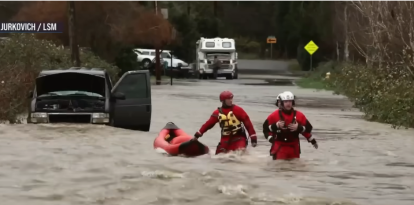Climate lockdowns: Environmentalists suggest confining people to their homes to reduce pollution
Radical activists fail to take into account the negative effects of mandatory isolation on citizens: mental health issues and government control.

Voz Media (Pexels - Canva
A new restrictive measure is gaining traction among radical environmentalists: climate lockdowns. The quarantines decreed by governments around the world during the coronavirus pandemic served to pave the way for measures that confine people to their homes. The goal: to reduce polluting emissions on the planet.
Green Matters justifies this idea, saying that "At the beginning of COVID-19, lockdowns were necessary to fight the deadly virus. To lower emissions, another type of lockdown might need to be used: Climate lockdowns."
Radical activists use the excuse of a minimal drop in emissions to ask for the same, or even more, restrictions that were experienced in the COVID era. Matt McGrath, environment correspondent for the BBC stated that "no war, no recession, no other pandemic, has had such a dramatic impact in CO2 emissions during the last century such as the one that COVID-19 has achieved in a few months," ignoring that the results in the atmosphere were minimal.
Many other media and personalities advance the idea that lockdowns are necessary to mitigate the climate crisis. Economist Mariana Mazzucato warned in Social Europe that governments are likely to implement such measures if society does not become able to "reform our economic structures and do capitalism differently":
Apocalypse, now
Fear of the future, infiltrated in the population with the threat of a climate apocalypse, would seem to be an essential part of the argument for population controls. Among them would be climate lockdowns. In The Hill, journalist Kristin Tate exposed many organizations, such as the Red Cross, and well-known personalities who have warned about the deaths that climate change can cause.
One of the figures in Tate's article is Bill Gates. The Microsoft founder, who constantly uses his private jet that releases tons of emissions into the environment, argued in an article that COVID-19 required "dramatic measures," but that climate change could be "worse." The text argued that "by 2060, climate change could be just as deadly as COVID-19, and by 2100 it could be five times as deadly."
Gates does not explicitly urge climate lockdowns but invites his readers to learn about "the lessons of COVID-19" and in another article argues that "the biggest changes need to happen at the governmental and societal level."
Lockdowns: bad for mental health, the economy... and the climate itself
Radical environmentalists do not take into account the serious consequences that the lockdown had on people's mental health during the pandemic. Several studies support and confirm that isolation is counterproductive for human beings' health.
Nor do they consider the negative impact it had on the economy. According to the World Bank, the lockdowns during COVID (2020) caused between 88 and 115 million people in the world to reach a level of extreme poverty.
Not even climate champions like the head of the UN's environment program, Inger Andersen, defend the idea that mass lockdowns have been good, saying that COVID-19 is in no way a "silver lining" for the environment.
"Visible, positive impacts – whether through improved air quality or reduced greenhouse gas emissions – are but temporary, because they come on the back of tragic economic slowdown and human distress," Andersen said.
Even Greenpeace itself agrees with this position, despite the fact that during the first year of COVID the emissions produced by fuels were reduced by around 7%, the concentration of CO2 in the atmosphere continued to grow:
Lockdowns are only the beginning
Despite these clear detrimental consequences to the health and well-being of citizens, proponents of climate lockdowns go even further. An article published by the World Business Council for Sustainable Development (WBCSD) that is signed by Professor Mazzucato explains that this restrictive measure would be accompanied by government control over various aspects of citizens' lives, always with the aim of "emission-reduction."
The article details that a climate lockdown would imply that the government takes other measures besides asking people to stay at home. Among them would be:
That is, total government control through the lockdown of citizens, something that many believe has already begun to happen with the so-called "15-minute cities." Canadian clinical psychologist Jordan Peterson tweeted:

























